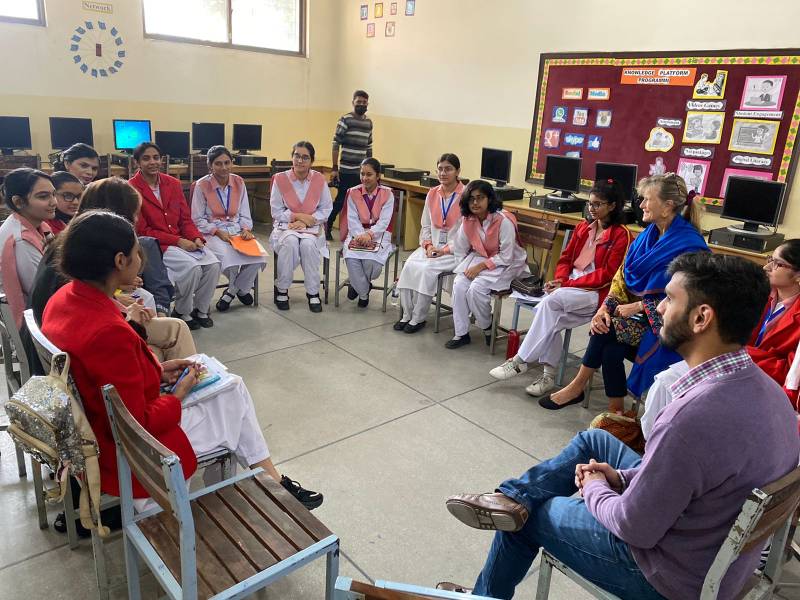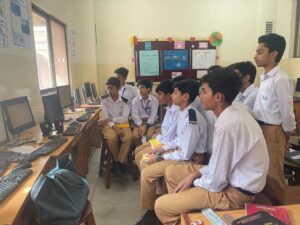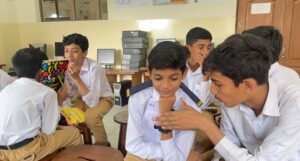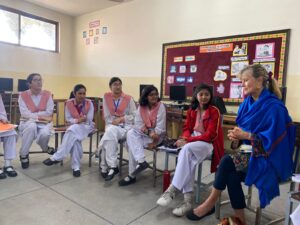
These days there is a feeling of increasing polarisation, no matter the scale or nature of the subject matter. Mixing this with the global village ecosystem we live in, it has become increasingly important to develop the skill of dialogue to ensure a harmonious and diverse society. Unfortunately, this soft skill has not yet become an official part of curriculum or training programs.
One organization has recognized the importance of dialogue and has created a safe space for students to learn and grow.
The Dialogue Academy is one of Beyond the Classroom’s latest initiatives that aim to foster compassionate and critical conversations across divides. Inspired by the separation caused by Covid-19, this is a brainchild of Qasim Aslam, who experienced first hand as a participant at the Seeds of Peace international camp, what a world where differences are dealt with through conversations and engagement would look like. As he came face to face with those whom you might have seen as enemies, he saw the powerful reality manifest that we can safely engage with others by learning to celebrate differences and engage in dialogue rather than some of the other choices we tend to see our societies make around us.
“At the Dialogue Academy, we recognize the importance of working with youth to inculcate these skills in them. By empowering the next generation with effective communication and conflict-resolution skills, we can help build a future generation of leaders who are capable of collaborating, and making the world a more peaceful place. We hope to inspire and equip the next generation of leaders with the skills and values necessary to build a more peaceful and equitable world.”
The value system at the organization revolves around respect, courage, initiative, engagement, and critical thinking. These five pillars empower the youth to build a better-shared future. By teaching the younger generation to engage with differences, they are equipped to hold multiple perspectives simultaneously, ending cycles of intolerance and paving the way to build shared communities.

Attending the Dialogue Academy has many benefits for students, including university application benefits, priority in selection processes for various national and international programs (Seeds of Peace and Future Leaders programs being some of the examples), networking opportunities across borders, developing critical thinking and communication skills, understanding conflicts, and learning the ability to mediate them constructively.
The Dialogue Academy has launched a virtual course with an interactive interface and facilitator, reaching a wider audience and adapting to the new hybrid system. The pilot project was launched in select batches in schools in Lahore. By incorporating technology, the Dialogue Academy can provide its program to more students, regardless of their location.
Aslam also shared some key details about the programs offered by the Academy. Overall, they offer three courses to teach students how to engage with people from diverse backgrounds and become better individuals and impactful global citizens. The Essentials of Dialogue course teaches students the basics of dialogue and the importance of active listening.

The Introduction to Facilitation course will teach students how to facilitate dialogue and lead productive conversations. Finally, the Introduction to Mediation course teaches students how to mediate conflicts constructively.
Their courses equip individuals with the necessary skills to hold productive conversations. Activity-based learning, the use of audio-visual elements, and peer-to-peer discussions facilitated by a trained facilitator are the techniques that make this course stand out and maintain higher engagement levels and learning mechanisms.
Establishing something new is not an easy task, and there are often hurdles that need to be dealt with. However, for trailblazers meeting these challenges, head-on is what they have set their eyes on. The team behind this initiative is no different.
Hasham Nasir, the lead of curriculum development at Dialogue Academy. He is a teaching fellow at the Lahore University of Management Sciences (LUMS), and a Chevening Scholar engaged in innovative and problem-focused interdisciplinary research on the role of the internet in the transformation of gender power relations, governance, statehood, and democracy in Pakistan.
Talking about his work, he said, “Dialogue Academy is making a real difference by encouraging open and respectful conversations among people with diverse perspectives. I'm excited to be developing a new curriculum that supports their mission, focusing on essential life skills like self-awareness, communication, and conflict resolution for youth. By working together, we're striving to create an environment where understanding and embracing differences can help promote stronger bonds within our communities.”
By empowering the next generation with effective communication and conflict-resolution
skills, Dialogue Academy's mission is to build the future generation of leaders who are capable of collaborating, making the world a place where we'll be excited about spending our remaining time here rather than worrying about it all the time.

Students can sign up for the program by visiting the Dialogue Academy website. Middle school students aged 13-17 years old are eligible to enroll in this course, which includes both national and regional batches.
Hana Tariq leads the school relationships at the Dialogue Academy. She has been a Global Schools Ambassador led by United Nations - SDSN. For over a decade, she has worked as an educational researcher aiming to explore the effects of social injustice on educational outcomes.
Sharing as to what they are looking for in the students selected for the program, she shared that “We are looking for individuals who can be agents of meaningful change, who can not only learn from our programs but also pass on the battalion with passion, compassion and even more so empathy. I would call these individuals the courageous leaders of tomorrow!”
All of this cannot be achieved without overcoming challenges. For the team, the key ones proved to be that the importance of dialogue is not widely recognized in our society, which is highly hierarchical and discourages questioning and curiosity. Effective communication and respectful listening are essential skills for building a sustainable future. Lack of awareness about the importance of dialogue is a major obstacle, as is insufficient infrastructure. While the world is still adjusting to virtual communication, this shift has opened up new opportunities to connect with participants from far-flung locations via screens. However, participants’ lack of technical support is also a significant issue.
Despite these challenges, the team is working to make breakthroughs consistently. The proof of success comes from some of the alumni who have shared their experiences and how the program has helped them grow as individuals. Zayen Mehboob learned the importance of listening to other people's opinions, even if they have opposite opinions to his. Mishaal Fatima Khan learned how to create a safe space where the other person or she doesn't have the fear of being judged. M Waqas Khan felt proud to know that his opinions are a replica of his moral values. Eshal Usman learned that different people have different perspectives because of their cultural background, ethnicity, religion, lifestyle, upbringing, and perception. Lastly, Aliza Fatima learned the importance of diversity and how it is essential to have different perspectives.
Dialogue is an essential soft skill that must be taught to ensure a harmonious and diverse society. Among all the negative news that one is bombarded with, initiatives like these keep hope for the future.
One organization has recognized the importance of dialogue and has created a safe space for students to learn and grow.
The Dialogue Academy is one of Beyond the Classroom’s latest initiatives that aim to foster compassionate and critical conversations across divides. Inspired by the separation caused by Covid-19, this is a brainchild of Qasim Aslam, who experienced first hand as a participant at the Seeds of Peace international camp, what a world where differences are dealt with through conversations and engagement would look like. As he came face to face with those whom you might have seen as enemies, he saw the powerful reality manifest that we can safely engage with others by learning to celebrate differences and engage in dialogue rather than some of the other choices we tend to see our societies make around us.
“At the Dialogue Academy, we recognize the importance of working with youth to inculcate these skills in them. By empowering the next generation with effective communication and conflict-resolution skills, we can help build a future generation of leaders who are capable of collaborating, and making the world a more peaceful place. We hope to inspire and equip the next generation of leaders with the skills and values necessary to build a more peaceful and equitable world.”
The value system at the organization revolves around respect, courage, initiative, engagement, and critical thinking. These five pillars empower the youth to build a better-shared future. By teaching the younger generation to engage with differences, they are equipped to hold multiple perspectives simultaneously, ending cycles of intolerance and paving the way to build shared communities.

Attending the Dialogue Academy has many benefits for students, including university application benefits, priority in selection processes for various national and international programs (Seeds of Peace and Future Leaders programs being some of the examples), networking opportunities across borders, developing critical thinking and communication skills, understanding conflicts, and learning the ability to mediate them constructively.
The Dialogue Academy has launched a virtual course with an interactive interface and facilitator, reaching a wider audience and adapting to the new hybrid system. The pilot project was launched in select batches in schools in Lahore. By incorporating technology, the Dialogue Academy can provide its program to more students, regardless of their location.
Aslam also shared some key details about the programs offered by the Academy. Overall, they offer three courses to teach students how to engage with people from diverse backgrounds and become better individuals and impactful global citizens. The Essentials of Dialogue course teaches students the basics of dialogue and the importance of active listening.

The Introduction to Facilitation course will teach students how to facilitate dialogue and lead productive conversations. Finally, the Introduction to Mediation course teaches students how to mediate conflicts constructively.
Their courses equip individuals with the necessary skills to hold productive conversations. Activity-based learning, the use of audio-visual elements, and peer-to-peer discussions facilitated by a trained facilitator are the techniques that make this course stand out and maintain higher engagement levels and learning mechanisms.
Establishing something new is not an easy task, and there are often hurdles that need to be dealt with. However, for trailblazers meeting these challenges, head-on is what they have set their eyes on. The team behind this initiative is no different.
Hasham Nasir, the lead of curriculum development at Dialogue Academy. He is a teaching fellow at the Lahore University of Management Sciences (LUMS), and a Chevening Scholar engaged in innovative and problem-focused interdisciplinary research on the role of the internet in the transformation of gender power relations, governance, statehood, and democracy in Pakistan.
Talking about his work, he said, “Dialogue Academy is making a real difference by encouraging open and respectful conversations among people with diverse perspectives. I'm excited to be developing a new curriculum that supports their mission, focusing on essential life skills like self-awareness, communication, and conflict resolution for youth. By working together, we're striving to create an environment where understanding and embracing differences can help promote stronger bonds within our communities.”
By empowering the next generation with effective communication and conflict-resolution
skills, Dialogue Academy's mission is to build the future generation of leaders who are capable of collaborating, making the world a place where we'll be excited about spending our remaining time here rather than worrying about it all the time.

Students can sign up for the program by visiting the Dialogue Academy website. Middle school students aged 13-17 years old are eligible to enroll in this course, which includes both national and regional batches.
Hana Tariq leads the school relationships at the Dialogue Academy. She has been a Global Schools Ambassador led by United Nations - SDSN. For over a decade, she has worked as an educational researcher aiming to explore the effects of social injustice on educational outcomes.
Sharing as to what they are looking for in the students selected for the program, she shared that “We are looking for individuals who can be agents of meaningful change, who can not only learn from our programs but also pass on the battalion with passion, compassion and even more so empathy. I would call these individuals the courageous leaders of tomorrow!”
All of this cannot be achieved without overcoming challenges. For the team, the key ones proved to be that the importance of dialogue is not widely recognized in our society, which is highly hierarchical and discourages questioning and curiosity. Effective communication and respectful listening are essential skills for building a sustainable future. Lack of awareness about the importance of dialogue is a major obstacle, as is insufficient infrastructure. While the world is still adjusting to virtual communication, this shift has opened up new opportunities to connect with participants from far-flung locations via screens. However, participants’ lack of technical support is also a significant issue.
Despite these challenges, the team is working to make breakthroughs consistently. The proof of success comes from some of the alumni who have shared their experiences and how the program has helped them grow as individuals. Zayen Mehboob learned the importance of listening to other people's opinions, even if they have opposite opinions to his. Mishaal Fatima Khan learned how to create a safe space where the other person or she doesn't have the fear of being judged. M Waqas Khan felt proud to know that his opinions are a replica of his moral values. Eshal Usman learned that different people have different perspectives because of their cultural background, ethnicity, religion, lifestyle, upbringing, and perception. Lastly, Aliza Fatima learned the importance of diversity and how it is essential to have different perspectives.
Dialogue is an essential soft skill that must be taught to ensure a harmonious and diverse society. Among all the negative news that one is bombarded with, initiatives like these keep hope for the future.

